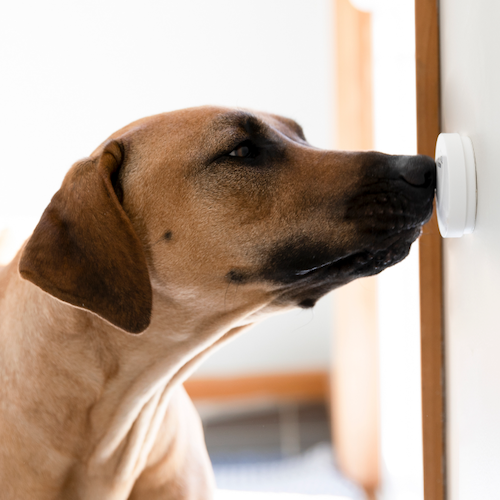Hi there Mighty Paw fam!
Today we’re answering three of your specific dog training questions. Thank you to everyone who posted questions on Facebook.
I’ve teamed up with our partner Lindsay from the dog training blog That Mutt to answer your questions today. She and I released the new ebook “50 Dog Training Tips: Your Training Problems Solved Now” and all of these questions are covered in much greater detail in the book.
Question #1 is from Barbara C., who asks:
How do I stop my 1-year-old German shepherd from jumping on us when we get home?
That is a great question and such a common problem!
We recommend you truly ignore your dog when he’s jumping, and we realize that’s easier said than done.
Have you ever had a dog trainer tell you to keep spinning around in an attempt to keep your back to the dog and "ignore” him? This is hardly “ignoring” the dog because most dogs think this is a fun game!
To truly ignore your dog means:
- no laughing at his cuteness
- no scolding
- don’t look at him
- just calmly walk right into him if he’s jumping as you go about your business
And yes, sometimes turning your back on him works as long as you do so in a calm way, truly ignoring him! (Not spinning around and laughing!) Instead, focus on something else like your phone and pretend your dog is not there.

A firm “NO!” might work for some dogs too, but Barley loves when I scold him because I’m paying attention to him! So, you might want to try something like a dog whistle to interrupt your dog's jumping and then give him praise when all four paws are on the ground.
We cover the topic of jumping in greater detail in our dog training ebook, "50 Dog Training Tips: Your Training Problems Solved Now." If you already have the ebook, it's on page 77. (The book is 184 pages and covers 50 training tips total!)
Question #2 is from Jacquie M., who asks:
How do I correct leash aggression in my 5-year-old German shepherd?
When we say “leash aggression” it usually means the dog is acting aggressive around other dogs or around people while on a leash. The dog might growl, bark or lunge at other dogs who pass by on walks.
Here’s what we recommend you do:
1. Try to pinpoint exactly when and why your dog reacts.
For example, Honey barks at large dogs or excited dogs once they are about 10 feet away from us. Or, Bentley barks at all dogs once they are 15 feet away, especially if they are big dogs.
Your dog might have 5 or 6 different “triggers.” Brainstorm with family members or roommates so you get the most accurate list. Dogs might react to runners, bikes, people wearing hats, kids, etc.
2. Find a high valued food reward your dog loves.
You may need to use hot dogs, string cheese, pieces of real steak or hamburger. Carry a treat pouch so you have easy access to the treats.
Find a type of treat your dog is willing to work for, even under stress. You’ll be working just outside of when your dog is normally “triggered.”
3. Work with your dog on basic commands within her “threshold.”
Head out for a walk with your dog using a training collar and treats. Seek out her “triggers” but stop just far enough away so she doesn’t bark or react. Give her lots of little treats.

Then, TURN AND LEAVE before you get close enough to trigger a reaction.
You want her to be like, “Wait! Why are we leaving? I want more treats!”
Eventually, you want her to associate her “trigger” with treats instead of fear or aggression. Like, “Oh, another big dog! That’s great! Where’s my string cheese?”
Of course, this is a very complicated training challenge that takes a lot of time. We go over this in much great detail in our new ebook that includes several chapters on leash training, pulling, aggression and more.
Our last question is from Jude L., who asks:
How do I stop our 6 year old dog from barking at us for attention? He is fed, walked, etc. He has a steady routine. I tell him to sit and be quiet. I spray water near him to distract him. Sometimes this works but more often, he doesn’t care.
Hi Jude, this does sound frustrating!
We recommend you write down exactly when your dog does this barking behavior. Is it at specific times of day, such as when he’s anticipating a meal or a walk? Take notes and see if you notice any patterns
Maybe it always happens after you do a specific behavior such as sit on the couch or sit on a certain chair or enter a certain room? Or maybe it’s when you give attention to your other dog? Or all of the above! Try to find the specific “triggers” for the barking.

If you can anticipate when your dog will start barking, you can try to prevent it from happening in the first place and get him focused on something else.
For example, if he barks every day around 3pm because he’s already anticipating dinner, you could give him a Kong toy stuffed with peanut butter at 2:45 before he starts barking.
We know he’s getting good exercise and training, but maybe increase these things a bit such as longer walks or more “freedom” on a long leash to explore new areas. Providing him with “puzzle” type toys or things to chew like bully sticks can also help.
We typically recommend ignoring the dog for barking - no scolding or looking at him and no petting. Get up and leave the room, closing the door behind him if you have to!
Just brainstorming some ideas here, but hopefully that will give you some ideas to work from with your guy!
We cover all of these topics and more in our ebook, along with much greater detail. The ebook is 184 pages total and also covers 50 total training topics!
Here are some examples of the training issues we cover in the ebook:
- Train your dog to be polite around visitors
- Fix common potty training issues
- Stop your dog from guarding food, toys or family members
- Help your dog work through separation anxiety
- Strategies to deal with hyperactive dogs!
- Help your dog stay focused on you around distractions
- Prevent fights when introducing your dog to new dogs
- Train multiple dogs in the same family
- Raise a well-behaved puppy
- Train your dog not to pull on the leash
- Kennel train your dog
- Get your dog use to being home alone
- Prevent unwanted behaviors like barking
- Teach your dog basic and advanced commands
The guide is available HERE for just $17 (normally $47)

"50 Dog Training Tips" comes with access to our private dog training group on Facebook so you can get support from myself and other dog people who understand what you're dealing with!
Let me know if you have any questions about the book and we’ll make sure to answer more of your dog training questions in one of our upcoming articles.
CJ + Barley







